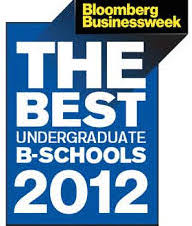 Bloomberg BusinessWeek yesterday (Oct. 28) announced that it is suspending its annual ranking of the best undergraduate business schools and may no longer do the list.
Bloomberg BusinessWeek yesterday (Oct. 28) announced that it is suspending its annual ranking of the best undergraduate business schools and may no longer do the list.
The magazine has been cranking out a numerical ranking of the top undergraduate business programs since 2006. The latest ranking, published in April of this year, had Notre Dame University’s Mendoza School of Business in first place for the fifth consecutive year. Only two other undergrad programs have topped the BusinessWeek list: Wharton did it three times from 2006 to 2008, while the University of Virginia’s McIntire School placed first once in 2009.
The suspension of the magazine’s undergraduate ranking comes as something of a surprise, though in recent years BusinessWeek has diminished its coverage of business education. Recently, for example, the website closed down the once popular forums it maintained for MBA applicants and students since 1994. In the past year, it has published far fewer articles online about business schools, and it rarely covers business education at all in its print magazine. The last time BusinessWeek featured its MBA ranking on the cover of the magazine was four years ago, and even then it put the story only on newsstand issues, which account for less than 5% of the magazine’s circulation. And although BusinessWeek used to regularly publish B-school guidebooks, it has not been in that market since 2008.
 ‘WILL LET YOU KNOW WHETHER AND WHEN WE EXPECT TO RE-LAUNCH’
‘WILL LET YOU KNOW WHETHER AND WHEN WE EXPECT TO RE-LAUNCH’
Observers believe the magazine decided to suspend its undergraduate ranking because it has an inexperienced business school team in place that in all likelihood is overwhelmed by the amount of project work necessary to publish both rankings in a single year. Last November, Businessweek lost the two core members of its business school team, Louis Lavelle and Geoff Gloeckler, who together had 16 years of experience reporting and writing on business education.
Announcing the suspension in an email to the schools, Business Education Editor Francesca Levy insisted that the magazine remains “committed to reporting on the full spectrum of business school programs and the education and career prospects of undergraduates, but measuring the vast undergrad B-school population presents unique challenges. To ensure a reliable and rigorous methodology, we will use the coming months to evaluate potential improvements to our rankings process and product. When this evaluation is complete, we will let you know whether and when we expect to re-launch Bloomberg Businessweek’s undergraduate business school ranking.”
Besides No. 1 Notre Dame, the top current top five programs last ranked by BusinessWeek are No. 2 UVA, No. 3 Cornell University’s Dyson School, Boston College, and Washington University’s Olin School of Business in St. Louis, MO.
The magazine also announced that it would begin to rank full-time MBA programs every year, beginning with its latest version expected Nov. 11. Since its launch in 1988, BusinessWeek has published its core business school ranking every other year, largely because the list doesn’t change all that much.
NOV. 11TH RANKING TO BE ‘UPDATED AND REFINED’ TO REFLECT BEST PRACTICES
In the email written by Levy, the magazine changed its mind about the frequency of publication, putting it on a schedule to better compete with annual rankings by U.S. News & World Report, The Financial Times, and The Economist. “We believe that publishing our flagship MBA ranking every year will better serve prospective and current students, as well as their future employers,” wrote Levy, who started at BusinessWeek 10 months ago in January of 2014.
Levy said the new MBA list has been “updated and refined to reflect current best practices in research. These updates incorporate direct feedback from schools, students and employers and result from our concerted effort over the past year to refresh and improve our business education coverage.”
For years, BusinessWeek has ranked full-time MBA programs on the basis of two surveys—one to the latest students and graduates and another to corporate recruiters—as well as a BW study of published academic articles. The methodology gives a 45% weight to both surveys, while it assigns a weight of 10% to articles published in specific journals by a school’s professors.
COMPARISONS TO PREVIOUS RANKINGS WILL BE MADE LESS MEANINGFULBusinessWeek has been mum about how it has changed its methodology for its forthcoming ranking, but Jonathan Rodkin, research and rankings coordinator, had earlier disclosed one significant alternation. Instead of insuring that the recruiter survey goes to the person in charge of MBA recruiting at a company or major division that hires business school graduates, Bloomberg BusinessWeek told business school officials earlier this year that it will be surveying multiple recruiters at each corporate employer—the same methodology adopted by U.S. News & World Report for its survey of recruiters and used by The Wall Street Journal in the past. The magazine has said it will survey every recruiter contact given to it by a business school.
Those changes are likely to make comparisons with previous rankings less meaningful and could very well result in the University of Chicago’s Booth School of Business losing its first place status. Booth has consistently been at the top of the ranking since 2006 for four consecutive biennial lists. According to BW’s 2012 ranking, the Top Five MBA programs in the U.S. are No. 2 Harvard Business School, No. 3. Wharton, No. 4 Stanford Graduate School of Business, and No. 5 Northwestern University’s Kellogg School of Management.
The earlier change in the methodology announced by Rodkin, however, would tend to bias the corporate recruiter sample in favor of schools that have especially strong alumni networks because the most sophisticated MBA hiring companies use returning alumni to recruit at their alma maters.












Questions about this article? Email us or leave a comment below.